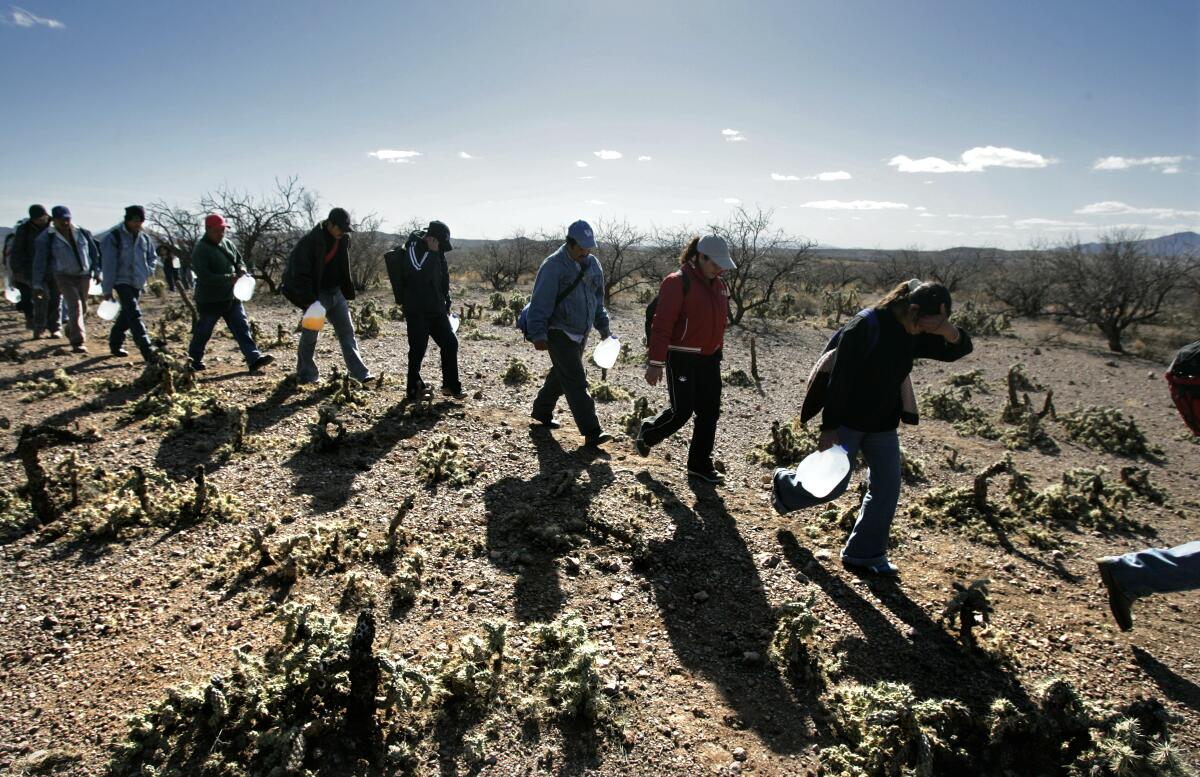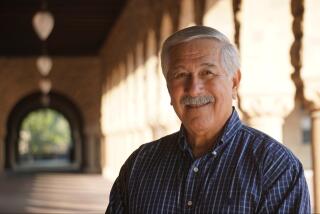Review: ‘American Dirt’s’ gripping story of escape falters amid moments of pandering

Jeanine Cummins’ fourth book, “American Dirt,” is a surprising departure from her previous novels, which mined her Irish ancestry for substance and inspiration. (She’s also of Puerto Rican heritage.) “American Dirt,” according to the author’s note, was shaped by four years of research and a concern for the plight of undocumented immigrants. It charts the heroic escape of a Mexican woman from the clutches of a vindictive drug lord in Acapulco.
Lydia Quixano Pérez is a middle-class Mexican woman who runs her own bookstore while her husband, Sebastián, is a journalist, a hazardous occupation, to say the least, in a country deemed one of the most dangerous for members of that profession. Though wary of the rising violence in the area, Lydia maintains a false sense of security by ensconcing herself in her shop and focusing on her maternal duties at home, where she’s overprotective of her 8-year-old son, Luca.
This relatively sheltered life breaks wide open when a quinceañera in the Pérez residence comes under attack by gunmen, leaving 16 family members dead, including Sebastián. Only Lydia and Luca survive. Though shocked by the assault, Lydia knows “from the very first sound of mayhem in the yard, that Javier was responsible for the attack.” That’s Javier Crespo Fuentes, a frequent client at her bookstore, with whom she became emotionally invested, and whom her husband had profiled as “La Lechuza,” a ruthless leader of a drug cartel.
With their lives threatened, Lydia and Luca embark on a journey out of the city and toward the U.S. border, navigating obstacles and setbacks at every turn, suffocated by a paranoia that one of “the modern bogeymen of Mexico” is waiting at the next corner. Their best fighting chance is to join the Central American migrants on their route to the border: “This is the one benefit to being a migrant, of having effected this disguise so completely: they are nearly invisible. No one looks at them, and in fact, people take pains not to look at them.”
Pam Houston reviews Jeanine Cummins’ ‘American Dirt.’ The novel digs into the Mexican border crisis and a mother’s dangerous journey to a better life.
Lydia and her son suffer hunger, threats of physical harm and other indignities just like all the other migrants, including Rebeca and Soledad, two young women from Honduras who become their faithful traveling companions. Lydia, however, is blessed by one stroke of luck after another: from being able to obtain hefty funds from her dead mother’s bank account, to being able to pass as a member of a missionary group (because of her fair features), to finding the right ally in the most dire of situations.
It’s a bit cinematic but indicative of the kinds of privileges that set Lydia apart from her fellow travelers. Yes, she faces the same perils, but as a Mexican citizen of means and an education, she has resources and connections that the others don’t.
Cummins’ decision to center the story on Lydia is a good decision, and I wish the book had remained a narrative about a woman who is willing to do the impossible to save her son. If hopping on La Bestia, the Train of Death, with her child in tow is what it takes to secure his well-being, then Lydia stands as a true testament to the strength and power of motherhood.
But the book ventures into the larger political minefield of immigration, particularly the sensitive territory of Central American migration. By employing the third-person omniscient point of view, Cummins not only shows insights from the unique perspective of Lydia, who is the outsider, but also from the perspectives of characters like Rebeca and Soledad, who are the insiders. The Honduran women’s tragic back stories sound a bit too familiar, and their characterizations are inscribed within an outsider’s wishful but two-dimensional view of women in this situation: They’re illustrious examples of resilience and perseverance; they are defined by their victimhood. That at one point they call themselves “Indian” and not “indigenous” also shows a lack of insider knowledge (or research) on the part of the author.
One supporting character who does benefit from the third-person omniscient point of view is Lydia’s son Luca. He’s a book-smart kid who matures from a boy who’s afraid someone will open the bathroom door on him to the intuitive boy who understands so viscerally the truth of his own mortality. Rebeca senses this growth when she tells him, “You seem a lot older than you are. Like you’re this old man in this tiny body.”
Indeed, it is Luca who surmises that, “though they all come from different places and different circumstances, some urban, some rural, some middle-class, some poor, some well educated, some illiterate, Salvadoran, Honduran, Guatemalan, Mexican, Indian, each of them carries some story of suffering on top of that train and into el norte beyond.”
In “American Dirt,” Cummins tells a highly original story, and I enjoyed following Lydia’s adventure. But the characters’ moralizing and other moments of pandering to social justice language toward the end of the book get in the way of the narrative, which, stripped of the other points of view, could have shined more compellingly. That’s unfortunate because Lydia’s journey is ultimately a story of personal growth. After all, once she was one of “the comfortable elite” who “pitied those poor people,” until fate intervened and she trekked over 1,000 kilometers in their shoes.
Jeanine Cummins
Flatiron Books: 400 pages; $27.99
González is a professor of English and director of the MFA program at Rutgers-Newark. He was born in Bakersfield and raised by farmworkers who migrated between Mexico and the U.S.

L.A. Times Book Club events
The book club’s 2020 lineup includes these upcoming author conversations:
Jan. 27: Ocean Vuong discusses “On Earth We’re Briefly Gorgeous.” Get tickets.
Feb. 20: Luis J. Rodriguez discusses “From Our Land to Our Land” (Jan. 28 release).
March 11: Jeanine Cummins discusses “American Dirt” (Jan. 21 release).
Info: latimes.com/bookclub
More to Read
Sign up for our Book Club newsletter
Get the latest news, events and more from the Los Angeles Times Book Club, and help us get L.A. reading and talking.
You may occasionally receive promotional content from the Los Angeles Times.











